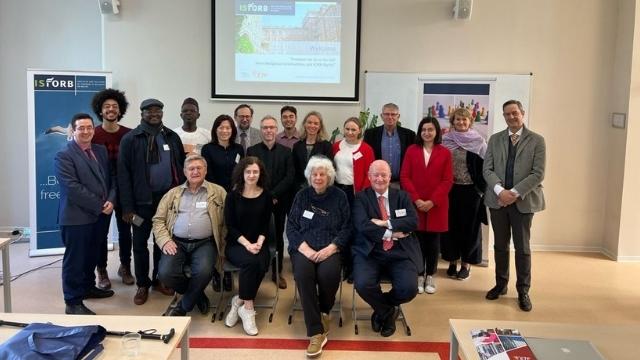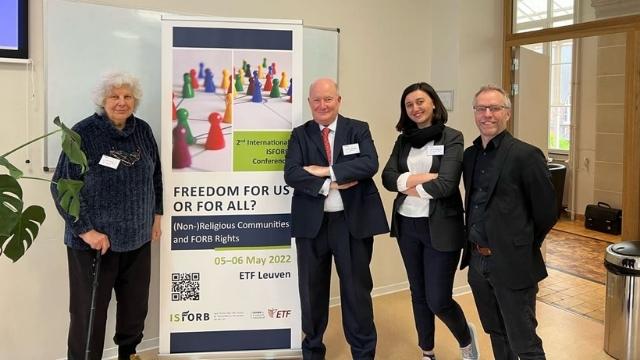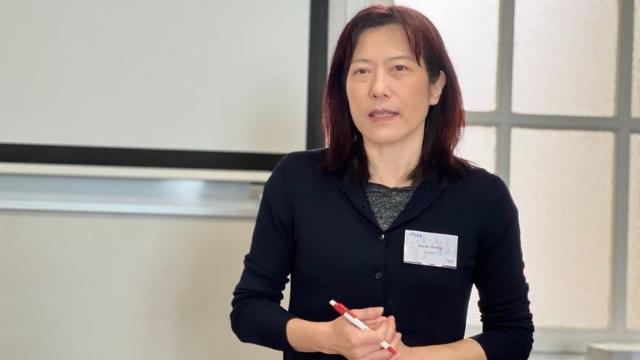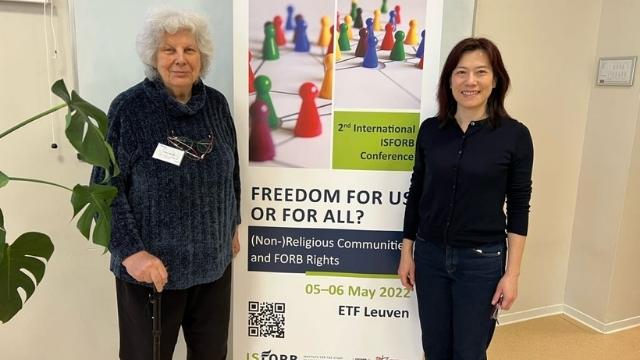Scholars and dizi presented at an academic conference about freedom of religion or belief four papers on the repression of Tai Ji Men.
by Daniela Bovolenta

Leuven, the capital of the Flemish Brabant in Belgium, is a city known throughout the world for its large and ancient universities. The first university was established there in 1425. Among Leuven’s universities, the Evangelical Theological Institute (ETF), whose origins date back to 1919, teaches theology and religious studies to Christians of all denominations. One of the peculiarities of the ETF is that it hosts an Institute for the Study of Freedom of Religion or Belief (ISFORB), which has emerged as a leading international academic institution in the field of religious liberty studies.
On May 5 and 6, 2022, the ISFORB hosted at the ETF an international conference on the theme “Freedom for Us or for All? (Non-)Religious Communities and FORB Rights.” The title alluded to the fact that FORB should also be granted to organizations that are not technically religions, a subject of obvious interest for the Tai Ji Men case.
The conference featured sessions on a variety of subjects, from the legal protection of the secret of the Catholic confession and similar practices in other religions to the violations of FORB in the territories of Ukraine that Russia has occupied during the current war.

Two sessions included papers on the Tai Ji Men case. The first session was introduced by Rosita Šorytė, of the European Federation for Freedom of Belief, who explained why in an international FORB conference it is appropriate to present the Tai Ji Men case. The topic also resonates with the general theme of the conference, since Tai Ji Men is not a religion, Šorytė said: it is a “menpai” (similar to a school) of qigong, martial arts, and self-cultivation, which is certainly rooted in esoteric Taoism but welcomes disciples (dizi) of all religions.
Cheng Yawen (Annie Cheng), a bank executive from London and a dizi, introduced the Tai Ji Men case. She started from the politically motivated raids of 1996 conducted by Prosecutor Hou Kuan-Jen, who accused the leader of Tai Ji Men, Dr. Hong Tao-Tze, who was arrested with his wife and two dizi, of fraud, tax evasion, and even—ridiculously—of “raising goblins.” The defendants were submitted to a harsh detention, Cheng said, and even the families of the arrested dizi were manipulated to induce them to admit what Prosecutor Hou wanted them to confess.

Cheng then summarized how the criminal case ended with the total victory of Dr. Hong and Tai Ji Men, who were declared innocent of all charges, including tax evasion. However what Cheng called a “tax discrimination” of Tai Ji Men continued, as the National Taxation Bureau (NTB) continued to impose ill-founded tax bills based exclusively on Prosecutor Hou’s old criminal charges, even after these charges had collapsed up to Taiwan’s Supreme Court.
Cheng finally presented the protests following the 2020 unsuccessful auction, and confiscation, based on the illegal tax action, of sacred land where Tai Ji Men intended to build a self-cultivation center. She mentioned that on September 19, 2020, these protests were answered by police brutality and the arrest of Ms. Huang, a peaceful demonstrator. These incidents, Cheng said, showed the concern of Taiwanese authorities with a protest that was gaining both domestic momentum and international support.
Another dizi, Liu Yin, who works as a managing director of a biotechnology company in the Netherlands, explained what it means to be a Tai Ji Men dizi. She reported her experiences in practicing qigong and also in accompanying Dr. Hong in his world tours promoting a culture of peace and love and insisting on the pivotal role of conscience. Liu described in vivid terms her trip of 2017 to the Kingdom of Bahrain, and her excitement of being part of Dr. Hong’s campaign that eventually led the United Nations to add the International Day of Conscience, April 5, to the list of its official days of observance.

In contrast with this joyful experience, Liu recalled the dramatic days of 1996 and the anguish of her family after Prosecutor Hou’s raid. As both a dizi and a business executive, she tried to answer the question why the Taiwanese tax bureaucrats insisted on issuing tax bills that were clearly illegal and contradicted the verdict of Taiwan’s Supreme Court.
Her answer was that Taiwan has a unique system of bonuses quickly rewarding bureaucrats who punish citizens for real or imaginary wrongdoings. This system, Liu explained, was born during the Martial Law period to reward those who discovered spies. Already in these days, it was a dangerous system. When it was applied to reward tax bureaucrats, it created a great number of abuses.
Massimo Introvigne, an Italian sociologist who serves as managing director of CESNUR, the Center for Studies on New Religions, and was in 2011 the Representative of the OSCE (Organization for Security and Cooperation in Europe) for combating racism, xenophobia, and religious intolerance and discrimination, offered a reflection on the Chinese notion of “xie jiao” as a context explaining what happened to Tai Ji Men in 1996.
“Xie jiao,” he said, is often translated as “cults” or “evil cults,” but this translation is anachronistic as the expression was created in the 7th century CE by a Taoist intellectual of the Tang court called Fu Yi to denounce Buddhism as a “heterodox teaching.” “Xie jiao” in the Imperial China were religious organizations accused of not supporting the government—and punished for this. While there is a rich literature on how the notion of “xie jiao” is used today in Mainland China, Introvigne said, few have studied how it was also used in Republican China and in Taiwan.
During the Martial Art period in Taiwan, Introvigne said, groups suspected of not supporting the Kuomintang government were declared “xie jiao” and persecuted, including Yiguandao, Soka Gakkai, and a Christian group called the New Testament Church. In 1987 the Martial Law was lifted in Taiwan, and in a subsequent post-authoritarian period FORB was proclaimed—but not fully guaranteed.
The raids of 1996, he explained, originated from the first democratic presidential elections and the fact that some large Buddhist religious movements had supported a different candidate from the one of the Kuomintang, who eventually won. After the election, these movements were denounced as “xie jiao” and persecuted, and the crackdown also involved groups that had not taken a political stance, but nonetheless were suspected of not having supported the ruling party, including Tai Ji Men.
The Tai Ji Men tax case, Introvigne concluded, shows that, although Taiwan is now a democracy, there are still among tax bureaucrats and other governmental officers residues of the old idea that religious and spiritual organizations are tolerated only if they support the powers that be—those who are suspected of not supporting them are discriminated as a “xie jiao.”

In the fifth session, Willy Fautré, co-founder and director of the Belgian NGO Human Rights Without Frontiers, presented a paper on the connection between tax law and FORB issues. He noted that this connection was noted by American Senator Orrin Hatch, a champion of religious liberty who passed away last month.
Fautré summarized the Tai Ji Men tax case, insisting that it would be a mistake to consider it as a technical domestic Taiwanese problem connected with tax law only. In fact, it is impossible to understand the Tai Ji Men case without acknowledging that it is both a tax case and a FORB case, and the two aspects are indistinguishable. Taiwanese bureaucrats used, or rather misused, tax law as a tool to violate FORB and create religious discrimination.
Fautré noted that on the one hand the violations of law committed by tax bureaucrats in Taiwan against Tai Ji Men are extreme and unique, but on the other hand it is not the only case where bureaucrats tried to persecute a religious or spiritual organization through the abuse of tax laws.
Fautré noted that several similar cases occurred in France, and the most similar one to the case of Tai Ji Men concerned the Jehovah’s Witnesses. The tax administration claimed that the money given by Jehovah’s Witnesses to their organization between 1993 to 1996 as “manual gifts” was in fact taxable. Including the fines, the Jehovah’s Witnesses were requested to pay the astronomical sum of Euro 57.5 million.

Unlike Taiwan, France is subject to the jurisdiction of a supra-national court, the European Court of Human Rights (ECHR). This court ruled in 2011 that French bureaucrats had misused tax law to discriminate against the Jehovah’s Witnesses, a group regarded as a “cult” by the government. Not only did the ECHR rule that the “manual gifts” to the Jehovah’s Witnesses were not taxable, it also ordered France to give back to them the money they had already paid, plus Euro 55,000 as contribution to their legal expenses. It was a happy end, Fautré said, yet the Jehovah’s Witnesses had to protest and file court cases for some 15 years before achieving the result.
The situation for Tai Ji Men, Fautré concluded, is even worse before their case has lasted for a longer period, more than 25 years, and “there is no Asian Court of Human Rights where they could lodge a complaint” against the government of Taiwan.
However, the decision of the ECHR in the case of the Jehovah’s Witnesses shows that there is a growing international consensus against the taxation of “manual gifts” given to a spiritual leader or organization, as the courts acknowledge that trying to impose taxes in these cases is a disguised form of FORB discrimination. In this sense, Fautré said, precedents in Europe and elsewhere may prove useful to Tai Ji Men, and hopefully persuade the government of Taiwan that how the case was and is being handled is contrary to widely acknowledged international standards.
Source: Bitter Winter
